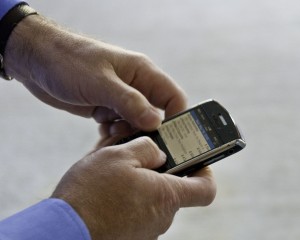 Today we have a long list of ways to connect and communicate through the latest and greatest technological gadgets. We have the new iphone4S. We can text, tweet, friend people on Facebook and yes, we can even do something that is almost getting to seem old fashioned…e-mail. Why is it with all of the communication advances available that we seem to be on the losing end when it comes to relating to people in person? Once upon a time this was referred to as interpersonal communication. We have more ways to connect than ever before, but we can’t seem to say anything without the assistance of electronic devices.
Today we have a long list of ways to connect and communicate through the latest and greatest technological gadgets. We have the new iphone4S. We can text, tweet, friend people on Facebook and yes, we can even do something that is almost getting to seem old fashioned…e-mail. Why is it with all of the communication advances available that we seem to be on the losing end when it comes to relating to people in person? Once upon a time this was referred to as interpersonal communication. We have more ways to connect than ever before, but we can’t seem to say anything without the assistance of electronic devices.
The issue was raised by a concerned and very astute parent who attended one of my recent media awareness presentations. During the discussion portion of my session, this young Mom explained how she was heartbroken because her “tween” daughter no longer wanted to attend parish youth group meetings. The mother explained that her daughter was apparently the only one in the youth group who did not own an iPhone. Not just an average cell phone by the way, but an iPhone. These are 11- and 12-year olds we’re talking about here! But, apparently it wasn’t only her daughter’s lack of an iPhone that made her feel like a fish out of water among her peers. The young girl told her mom that every time she tried to engage in conversation with the others they would respond with blank stares and then quickly get back to texting or playing a game on their phone. This young girl was never able to enjoy the youth group programs once they got underway at her church because the meet and greet or social times before and after were just so uncomfortable for her. Her daughter’s ability to engage in an actual verbal conversation was foreign to the other students as they simply didn’t know how to respond, so they went back to doing what made them feel the most comfortable.
The technological advances of the 21st century no doubt provide us with great tools of all kinds. We have the ability to witness and evangelize like never before and let’s face it, in many ways these gadgets do make life a lot easier. As some researchers point out, when it comes to impressionable young people, it really is a mixed bag. In August, Psychology professor, Dr. Larry Rosen told the annual convention of the American Psychological Association that young people who spend too much time with their technology, namely social media, show more signs of antisocial behaviors, psychological disorders, and are more prone to depression and anxiety. Rosen’s talk entitled “Poke Me: How Social Networks Can Both Help and Harm Our Kids”, did include some positive notes about social media usage. Kids with social media skills tend to show more empathy to their on-line friends. Social media is also providing educators with unique ways to engage students. Overall though, the negatives definitely outweighed the positives of Dr. Rosen’s list when it came to looking at the impact of social networking on youth.
I did my best to reassure the mom I met in my travels recently that she was doing the right thing by not giving into her daughter’s desire for an iPhone and engaging with her daughter about her concerns and media usage. She is doing what the experts, including Dr. Rosen, say parents should do; talk to their kids about the impact of media on their lives and relationships. I also encouraged her to explain to her daughter that the problem is the same with most other young people. Unfortunately, this mom is a rarity. I fear, if more of us don’t do what this mom is doing, that simple conversation or interpersonal communication will soon be considered old fashioned or passé.
Please help us in our mission to assist readers to integrate their Catholic faith, family and work. Tell your family and friends about this article using both the Recommend and Share buttons below and via email. We value your comments and encourage you to leave your thoughts below. Thank you! – The Editors












